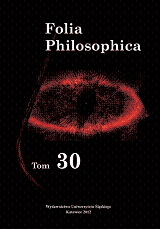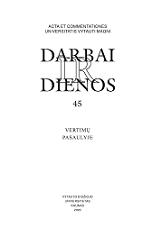
Kilka uwag o „Logosie”, czyli filozofia kultury jako filozofia pierwsza
The paper addresses history of German journal „Logos. Internationale Zeitschrift für Philosophie der Kultur”. I discuss its genesis and principles (internationalism, criticism, pluralism). Establishing „Logos” was a decisive attack on the entire positivist, materialistic and mechanicist way of thinking of 19th century. The most important task of the journal was realisation of the postulate of building a scientific philosophy of culture. I refer also to the „Logos” later drift towards Nazism, which led to journal’s collapse.
More...
